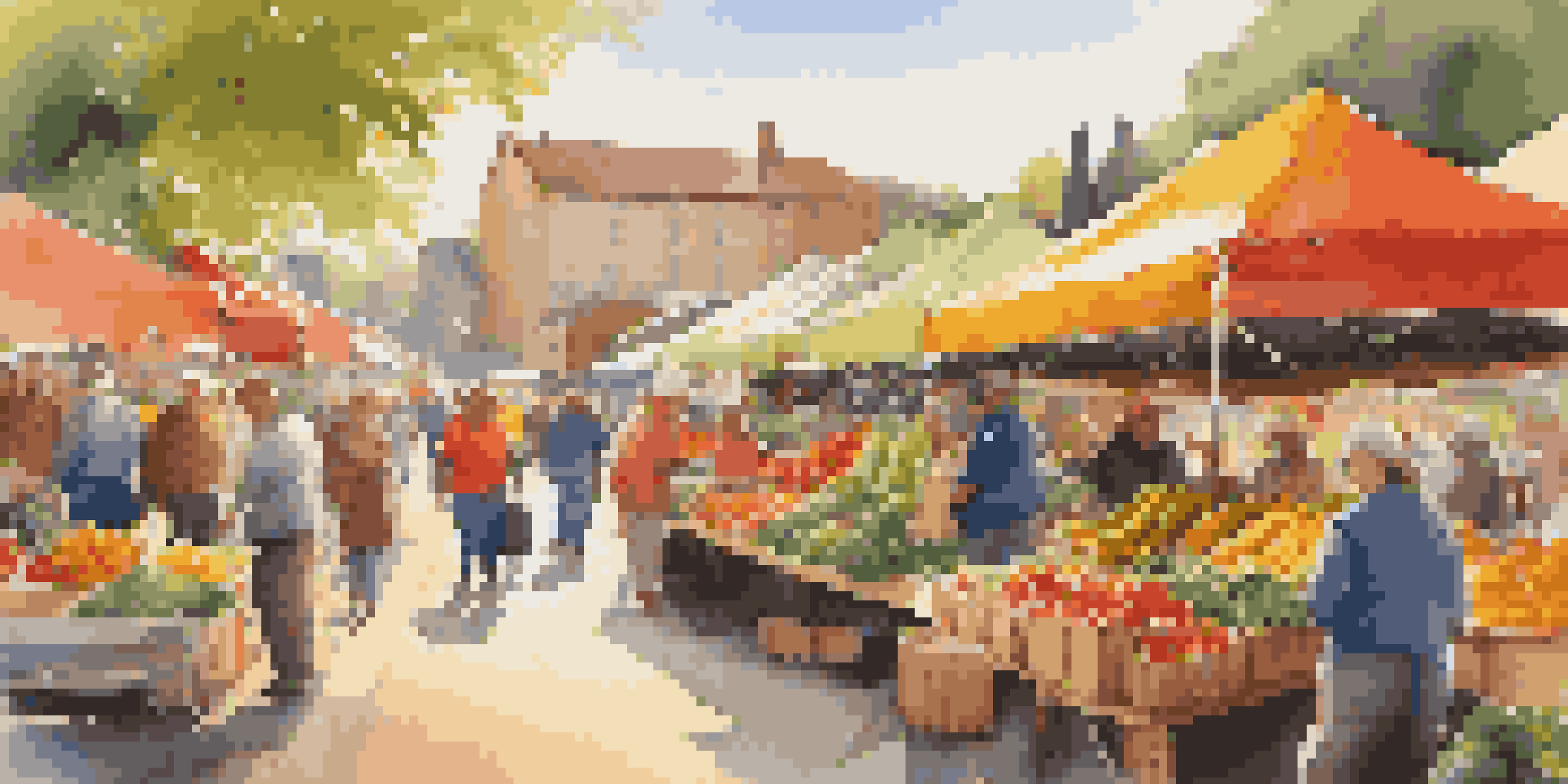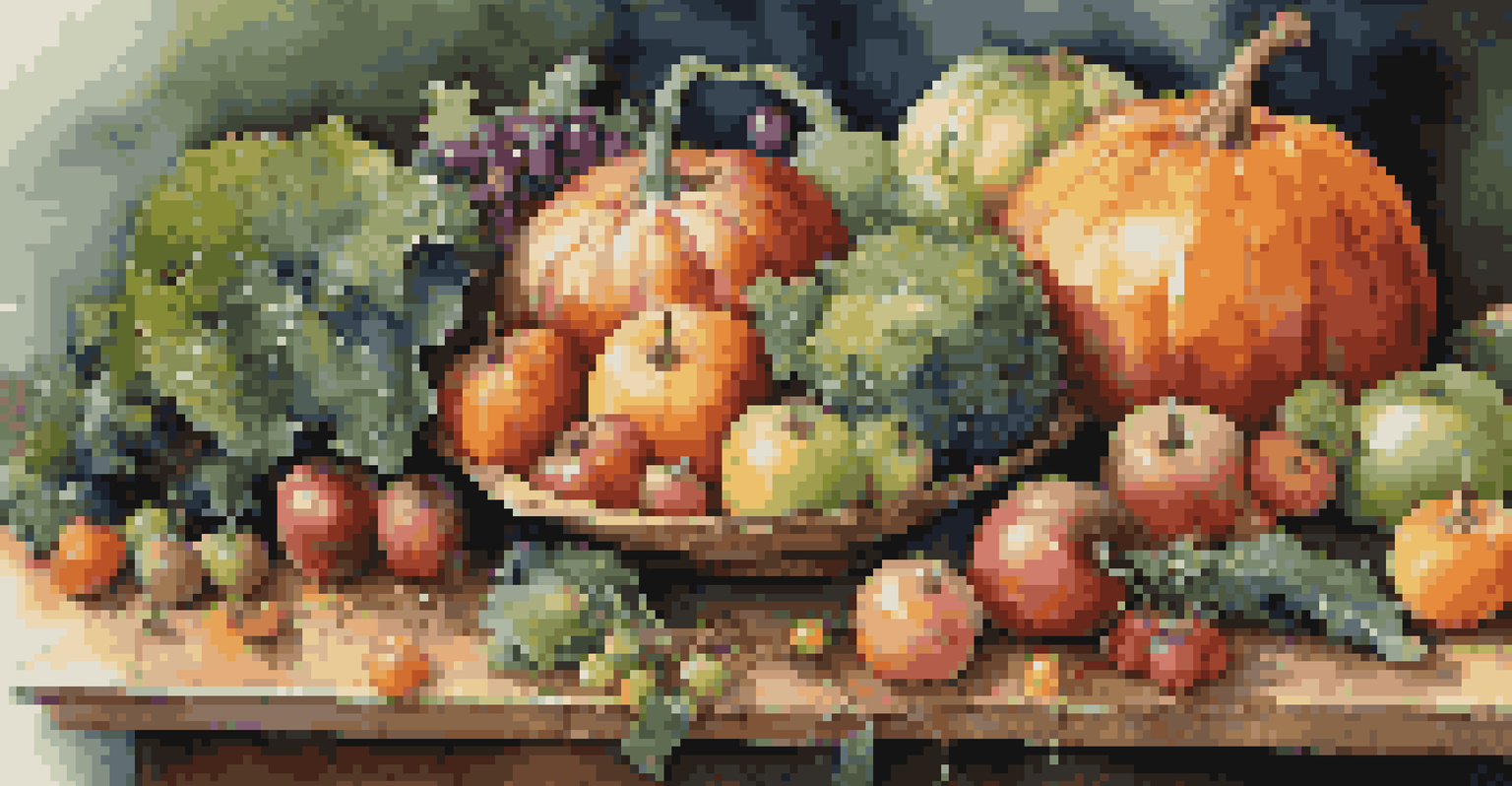How to Support Local Farmers: Benefits of Buying Local

Understanding the Importance of Local Farming
Local farming is more than just a trend; it's a vital part of our communities. When we think of local farmers, we often picture the family-operated farms that dot the countryside. These farms not only provide fresh produce but also contribute to the local economy and environment.
Support your local farmers, and you support your community.
Supporting local farmers means investing in our community's future. When you buy local, your money stays within the community, helping to create jobs and support other local businesses. This interconnectedness fosters a thriving local economy, which benefits everyone.
Additionally, local farmers often use sustainable practices that protect the environment. By choosing local products, you're also making an environmentally conscious decision, which is increasingly important in today's world.
Health Benefits of Eating Locally Grown Food
One of the biggest advantages of buying local is the health benefits associated with fresh produce. Local fruits and vegetables are typically harvested at their peak ripeness, ensuring maximum flavor and nutrient content. In contrast, produce that travels long distances often loses its freshness and nutritional value during transit.

Moreover, local farms often use fewer preservatives and chemicals compared to larger commercial farms. This means that by choosing local, you're likely consuming fewer harmful substances, leading to a healthier lifestyle overall.
Support Local for Community Growth
Buying from local farmers keeps money within the community, fostering job creation and supporting other local businesses.
Eating locally also encourages a more varied diet. Seasonal produce can inspire creativity in the kitchen, as you're prompted to try new recipes and ingredients that are available in your area.
Strengthening Community Connections Through Local Buying
When you buy from local farmers, you're not just making a purchase; you're building relationships. Many farmers' markets encourage interactions between consumers and producers, allowing you to learn about the food you eat. This personal connection can enhance your appreciation for your meals.
Eating fresh food is not just about nutrition; it's about connecting with the land and the people who grow it.
These community connections can lead to a stronger sense of belonging. Knowing where your food comes from and who grows it fosters a shared responsibility for supporting one another. It creates a bond that extends beyond just food; it's about community.
Additionally, participating in local food events or markets allows you to meet like-minded individuals who share your values. This sense of community can lead to great friendships and collaborations centered around food and sustainability.
Economic Impact of Supporting Local Farmers
Buying local has a significant economic impact on your community. For every dollar spent at a local farm or market, a larger portion stays within the community compared to spending at national chains. This helps sustain local jobs and encourages the growth of small businesses.
Local farmers often reinvest their profits back into the community, whether it's through hiring local labor or purchasing supplies from nearby businesses. This cycle of reinvestment is crucial for maintaining a vibrant local economy.
Healthier Food Choices Await You
Local produce is fresher and often grown with fewer chemicals, promoting better health and nutrition.
Moreover, supporting local farms can lead to the preservation of farmland. As communities rally around local agriculture, there's a stronger push to protect these lands from development, ensuring they remain available for future generations.
Environmental Benefits of Buying Local Produce
Choosing local produce significantly reduces your carbon footprint. When you buy food that has traveled hundreds or even thousands of miles, you're contributing to greenhouse gas emissions from transportation. Local food often travels a fraction of that distance, making it a more eco-friendly choice.
In addition to reducing transportation emissions, local farms are often more sustainable in their practices. Many local farmers prioritize organic methods and crop rotation, which can enhance soil health and biodiversity. These practices contribute to a healthier ecosystem.
Supporting local agriculture also encourages the preservation of green spaces. As communities value their local farms, there's often a stronger commitment to protecting farmland from urban sprawl, which is essential for maintaining biodiversity and natural habitats.
The Joy of Seasonal Eating: A Culinary Adventure
Eating locally means embracing seasonal produce, which can transform your culinary experiences. Each season brings a new selection of fruits and vegetables, encouraging you to experiment with different recipes and flavors. It can feel like a delightful culinary adventure!
When you align your meals with the seasons, you gain a deeper appreciation for the natural cycles of food. This approach not only supports local farmers but also helps you connect with the rhythm of nature.
Engage with Your Community
Purchasing local food helps build meaningful connections with farmers and fellow community members, enhancing social bonds.
Seasonal eating also fosters creativity in the kitchen. You might find yourself trying new dishes or rediscovering forgotten recipes that showcase the best of what your local farms have to offer.
How to Start Supporting Local Farmers Today
Getting involved in supporting local farmers is easier than you might think! Start by visiting your local farmers' market. These vibrant markets often feature a variety of fresh produce, homemade goods, and artisan products. It's a great way to meet farmers and learn about their practices.
Another option is to join a Community Supported Agriculture (CSA) program. By subscribing to a CSA, you receive a regular share of seasonal produce directly from a local farm, ensuring you always have fresh ingredients on hand.

Lastly, consider spreading the word about local farms and their benefits. Share your experiences on social media or with friends and family. The more people who support local farmers, the stronger our communities will become!